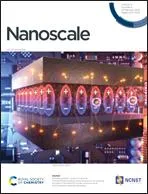A practical and highly sensitive C3N4-TYR fluorescent probe for convenient detection of dopamine
Literature Information
Hao Li, Manman Yang, Juan Liu, Yalin Zhang, Yanmei Yang, Hui Huang, Yang Liu, Zhenhui Kang
The C3N4-tyrosinase (TYR) hybrid is a highly accurate, sensitive and simple fluorescent probe for the detection of dopamine (DOPA). Under optimized conditions, the relative fluorescence intensity of C3N4-TYR is proportional to the DOPA concentration in the range from 1 × 10−3 to 3 × 10−8 mol L−1 with a correlation coefficient of 0.995. In the present system, the detection limit achieved is as low as 3 × 10−8 mol L−1. Notably, these quantitative detection results for clinical samples are comparable to those of high performance liquid chromatography. Moreover, the enzyme-encapsulated C3N4 sensing arrays on both glass slide and test paper were evaluated, which revealed sensitive detection and excellent stability. The results reported here provide a new approach for the design of a multifunctional nanosensor for the detection of bio-molecules.
Related Literature
IF 6.367
A hollow neuronal carbon skeleton with ultrahigh pyridinic N content as a self-supporting potassium-ion battery anodeIF 6.367
Synthesis and hydrogen evolving catalysis of a panchromatic photochemical molecular deviceIF 6.367
Electrocatalytic cleavage of lignin model dimers using ruthenium supported on activated carbon clothIF 6.367
From zinco(ii) arsaketenes to silylene-stabilised zinco arsinidene complexesIF 6.222
Retraction: Chemical synthesis and antigenic activity of a phosphatidylinositol mannoside epitope from Mycobacterium tuberculosisIF 6.222
Three-terminal III–V/Si tandem solar cells enabled by a transparent conductive adhesiveIF 6.367
CaMoO4 nanosheet arrays for efficient and durable water oxidation electrocatalysis under alkaline conditionsIF 6.222
Chemoproteomics-based target profiling of sinomenine reveals multiple protein regulators of inflammationIF 6.222
Carbon-based photocatalysts for enhanced photocatalytic reduction of CO2 to solar fuelsIF 6.367
Source Journal
Nanoscale

Nanoscale is a high-impact international journal, publishing high-quality research across nanoscience and nanotechnology. Nanoscale publishes a full mix of research articles on experimental and theoretical work, including reviews, communications, and full papers. Highly interdisciplinary, Nanoscale appeals to scientists, researchers and professionals interested in nanoscience and nanotechnology, quantum materials and quantum technology, including the areas of physics, chemistry, biology, medicine, materials, energy/environment, information technology, detection science, healthcare and drug discovery, and electronics. For publication in Nanoscale, papers must report high-quality reproducible new work that will be of significant general interest to the journal's wide international readership. Nanoscale is a collaborative venture between the Royal Society of Chemistry Publishing and a leading nanoscience research centre, the National Center for Nanoscience and Technology (NCNST) in Beijing, China. image block The journal publishes weekly issues, complementing and building on the nano content already published across the Royal Society of Chemistry Publishing journal portfolio. Since its launch in late 2009, Nanoscale has established itself as a platform for high-quality, cross-community research that bridges the various disciplines involved with nanoscience and nanotechnology, publishing important research from leading international research groups.
Recommended Compounds
Recommended Suppliers
 Chengdu Aofan Medicine Technology Co., Ltd.
Chengdu Aofan Medicine Technology Co., Ltd. Wuhan Rongshen Chemical Industry Co., Ltd
Wuhan Rongshen Chemical Industry Co., Ltd Anhui Yiqu Tonggong Biotechnology Co., Ltd.
Anhui Yiqu Tonggong Biotechnology Co., Ltd. Han Shen Chemical Co., Ltd.
Han Shen Chemical Co., Ltd. Jiangxi Besida Real Industry Co., Ltd.
Jiangxi Besida Real Industry Co., Ltd. Shanghai JiuFang Technology Co., Ltd.
Shanghai JiuFang Technology Co., Ltd. F.I.R.S.T. Gesellschaft für technisch-wissenschaftliche Softwareanwendungen mbH
F.I.R.S.T. Gesellschaft für technisch-wissenschaftliche Softwareanwendungen mbH Beijing Vosisen Technology Co., Ltd
Beijing Vosisen Technology Co., Ltd Zhejiang Weirong Pharmaceutical Chemical Co., Ltd.
Zhejiang Weirong Pharmaceutical Chemical Co., Ltd.










![697235-38-4 - Methyl (1R,2R,3S,3aR,8bS)-6-({(2S,3R,6R)-6-[(1R)-1,2-dihydroxyethyl]-3-methoxy-1,4-dioxan-2-yl}oxy)-1,8b-dihydroxy-8-methoxy-3a-(4-methoxyphenyl)-3-phenyl-2,3,3a,8b-tetrahydro-1H-benzo[b]cyclopenta[d]
furan-2-carboxylate 697235-38-4 - Methyl (1R,2R,3S,3aR,8bS)-6-({(2S,3R,6R)-6-[(1R)-1,2-dihydroxyethyl]-3-methoxy-1,4-dioxan-2-yl}oxy)-1,8b-dihydroxy-8-methoxy-3a-(4-methoxyphenyl)-3-phenyl-2,3,3a,8b-tetrahydro-1H-benzo[b]cyclopenta[d]
furan-2-carboxylate](/structs/697/697235-38-4-ee3a.webp)
![57423-71-9 - (1R,2R,4R,6S,11R,12S,15R,18S,19R,20S,21S,23R,26R)-15-Hydroxy-11,18,21-trimethyl-5,17,24,28,29-pentaoxanonacyclo[17.9.1.1~1,20~.0~2,12~.0~4,6~.0~6,11~.0~15,19~.0~18,23~.0~21,26~]triacont-8-ene-10,16,25
,30-tetrone 57423-71-9 - (1R,2R,4R,6S,11R,12S,15R,18S,19R,20S,21S,23R,26R)-15-Hydroxy-11,18,21-trimethyl-5,17,24,28,29-pentaoxanonacyclo[17.9.1.1~1,20~.0~2,12~.0~4,6~.0~6,11~.0~15,19~.0~18,23~.0~21,26~]triacont-8-ene-10,16,25
,30-tetrone](/structs/574/57423-71-9-78dc.webp)


